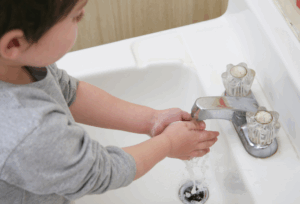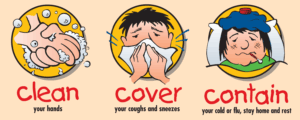Decreasing the Risk of Infection with Healthy Habits
Reducing the spread of infection is essential for maintaining good health and preventing illness. Common, everyday things that we do can impact our health. These simple practices start at home and can protect individuals, families and communities from the spread of diseases not just in our homes but especially in shared spaces. By following proper health habits, people can strengthen their immune systems and reduce the risk of infections, leading to a healthier and safer environment for everyone.
Immunize against infectious diseases
Immunization has saved more lives than any other health intervention. Many of us don’t know what life would be like without them or why it is so important to continue to vaccinate.
Vaccinations are essential if you are to avoid getting sick and help prevent the spread of infectious diseases.
- Children should receive the recommended childhood vaccinations.
- Adults should make sure their vaccinations are up to date.
- When travelling abroad, check with your health-care provider about additional immunizations.
Hand hygiene
 Handwashing or sanitizing your hands is one of the easiest ways to reduce the spread of infections and keep yourself and others safe. Keeping your hands clean helps stop the spread of germs and viruses.
Handwashing or sanitizing your hands is one of the easiest ways to reduce the spread of infections and keep yourself and others safe. Keeping your hands clean helps stop the spread of germs and viruses.
- When washing your hands, wet your hands with clean water and add soap. Rub your hands together, making sure to clean all areas for at least 20 seconds. Then, rinse well with clean water and dry with a clean towel or let them air dry.
- Using an alcohol-based hand sanitizer is also effective at killing germs and viruses. If using hand sanitizer, make sure you use enough product to cover your hands, rub it in and allow it to dry.
When to Wash Your Hands:
- Before and after eating or preparing food.
- After using the restroom.
- After touching animals or pets.
- After coughing, sneezing, or blowing your nose.
- After being in public places.
- Before and after caring for someone who is sick.
Stay at home if you are sick
Staying at home and limiting contact with others when you’re sick is one of the best ways to prevent the spread of the infection to others. Keep your distance from other members of your household to keep them from getting sick as well. If you must go out, consider wearing a facemask. Face masks can help reduce the spread of respiratory illnesses, including COVID-19 and flu. Wearing a facemask can protect ourselves and others.
Cover coughs and sneezes
When you cough or sneeze, you release tiny droplets that can carry viruses and bacteria. Covering your mouth and nose with a tissue or your elbow helps prevent these droplets from spreading into the air and potentially infecting others.
If you are unwell: Cover your coughs and sneezes to prevent spreading the illness to others.
- Cover your mouth and nose with a tissue when you cough or sneeze – then put the tissue in a bin.
- If you don’t have a tissue, cough or sneeze into your elbow. Be sure to clean your hands afterward.

Other important habits that help keep us healthy
- Practice safe food handling by washing your hands before and after handling food, cooking food to safe temperatures, and storing food properly.
- Eating a well-balanced diet and staying hydrated.
- Practicing safe sex by using condoms and other protective measures to prevent sexually transmitted and blood-borne infections.
- Avoid sharing personal items such as toothbrushes, razors and other personal items.
Services related to this information:
- Contact your Public Health Nurse.
- Contact your physician, nurse practitioner, or pharmacist.
- 811 HealthLine (Newfoundland & Labrador) – Call 811 or 1-888-709-2929 / TTY 1-888-709-3555

